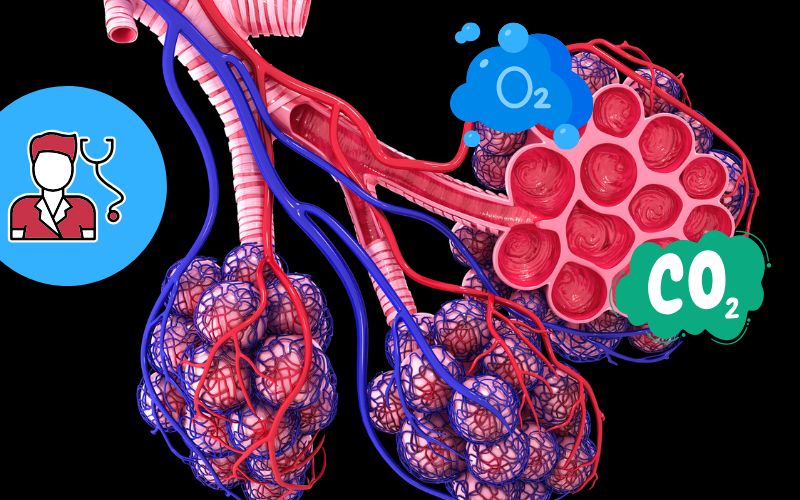Yawning is something we all do every day, but have you ever wondered why we yawn? You might yawn when you are tired, bored, or simply because you saw someone else yawn. It seems like a straightforward response, but scientists are still working to fully understand why it happens. While medically, doctors have a different theory with proper reasoning. They explai that yawning helps cool the brain and regulate oxygen flow.
However, if you find yourself yawning excessively and wondering, “Why am I yawning so much?”, it might indicate an underlying issue. In some cases, frequent yawning may be linked to a lack of sleep, stress, or even certain medical conditions. In rare situations, it could be associated with symptoms like breathlessness or chest pain while yawning, which should not be ignored.
A Pulmonologist in Gurgaon explains the possible causes of yawning and when it is necessary to seek medical advice.
What Is Yawning?
Yawning is the natural reflex that occurs when you open your mouth wide, inhale deeply, and breathe out slowly. The duration is typically between 4 to 7 seconds. Humans yawn for many reasons, such as when they are tired or bored, or even after they see someone else yawning. According to pulmonologists in Gurgaon and Delhi, yawning keeps the brain cool as it supplies the oxygen that helps the functioning. But surprisingly, yawning isn’t common just after birth; unborn babies can start yawning as early as 11 weeks in the womb, so it is a normal part ofhuman life.
Possible Reasons for Yawning
Medically, yawning serves multiple purposes in the body, Here are some possible reasons for yawning:
- Oxygen and Carbon Dioxide Regulation: Yawning plays a role in respiratory function by facilitating gas exchange in the lungs. The deep inhalation during yawning allows more oxygen to reach the alveoli—the tiny air sacs in the lungs responsible for oxygen and carbon dioxide exchange. This helps remove excess carbon dioxide from the bloodstream while increasing oxygen levels, ensuring better oxygenation of the brain and body.
- Brain Cooling: Yawning helps to cool the brain. When we yawn, we inhale a deep breath of fresh air filled with oxygen, which help cool the brain.
- Staying Alert: Yawning help us stay awake and alert. When we feel tired or bored, brain activity slows down, and yawning acts as a natural mechanism to boost alertness. Taking a deep breath during a yawn increases oxygen intake, which enhances circulation and helps us feel more awake.
- Social Communication: Yawning is contagious. We tend to yawn when we see someone else do so. Scientists believe this may relate to empathy and social bonding. It suggests that we unconsciously bond with other people and feel what they feel. Even dogs and chimpanzees yawn when they see someone else do it.
When Does Yawning Become Too Much?
Yawning is a natural reflex, but excessive yawning or continuous yawning is not a good sign for you; it may be a sign that something’s not right. If you yawn several times in your day, there could be multiple reasons:
- Lack of Sleep: If you didn’t get your sleep the night before, there’s a good chance you will feel fatigue that results in numerous yawns throughout the day.
- Sleep Disorders: Sleep disorders such as sleep apnea or insomnia can lead to poor sleep quality, which can cause excessive yawning.
- Medicines: Certain medications — including some antidepressants or antihistamines — note yawning as a possible after effect.
- Disease: Some diseases like brain diseases, heart disease, and multiple sclerosis can also cause constant yawning and shortness of breath.
How to Stop Yawning?
Yawning is a natural reflex — but when it happens too much, it can be distracting. Here’s how to stop yawning:
- Get Quality Sleep: Get 7-9 hours of good sleep every night. Having a regular sleep schedule regulates your body’s natural sleep-wake cycle.
- Be Active: Getting regular exercise in the daytime gives you more energy, minimizing fatigue that tends to lead to yawning.
- Pranayam: Practice deep breathing, pranayam and meditation with breathing exercises
- Hydrate: When dehydration occurs, tiredness follows. Keep a water bottle nearby and sip from it throughout the day.
- Stress Management: Yawning can be a form of stress. Practice some relaxation strategies like deep breathing, meditation, or yoga.

Home Remedies for Excessive Yawning
If you are yawning more than usual, there are some simple lifestyle changes and home remedies for excessive yawning that will help in easing it. Here are some of the very effective techniques:
- Regular Sleep Schedule: Aim to go to bed and rise at the same time every day, including on weekends. A well-recovered body also leads to less fatigue and minimizes yawning.
- Limit Caffeine and Alcohol: Alcohol can also help you stay awake, but limit this too, as it can destroy your sleep cycle when you wake up feeling tired the next day. Alcohol, meanwhile, harms your sleep quality, which means more yawning.
- Establish a Soothing Bedtime Routine: Do calming activities before sleeping like reading a book, meditating, or soaking in a warm bath. This will make your body and mind stay calm, and you will have a good sleep.
If the above remedies do not seem to work and yawning persists, it may be beneficial to visit a Pulmonologist in Gurgaon to understand the situation and check for any underlying health issues in your lungs.
When to See a Pulmonologist?
Sometimes, people experience constant yawning and shortness of breath. This can occur if the body is attempting to extract additional oxygen. But if you occasionally find yourself short of breath when yawning, or you have chest pain when yawning, that can be worrisome. This could happen due to strain in the chest muscles. If you’re in acute pain or have chronic pain, it’s important to consult medical advice, as you may have worse than what appears to be the case.
And if you live in Delhi or Gurgaon and feel like you’re yawning a lot, with breathing problems or chest pain (especially during yawning), it might be time to consult a specialist. A Pulmonologist in Gurgaon at Doctors Hub can help diagnose and treat lung-related problems. For residents in Dwarka, seeking a pulmonology specialist in Dwarka at Doctor Hub Dwarka Clinic ensures you receive care close to home. Early diagnosis and chest pain treatment can prevent potential complications.
Awareness of yawning is part of normal life; however, if you experience recurrent yawning or other symptoms, include medical attention. Take care of yourself; your health is very important, and learning the causes of yawning helps you take care of yourself.
Listening to your body and recognizing why you yawn might help you better care for your health. If this problem is affecting your daily life, you should consult a Pulmonology Specialist in Gurgaon to get the appropriate diagnosis and treatment. Visit My Doctor’s Hub to book an appointment with an experienced Pulmonologist in Gurgaon and get expert advice for better health.













